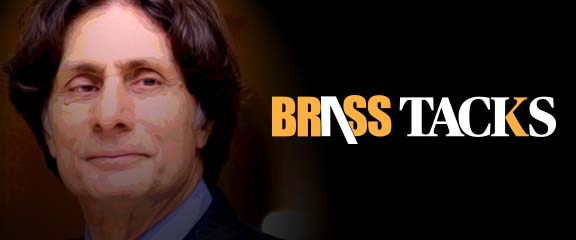“You are free. You are free to go to your temples, you are free to go to your mosques, or to any other place or worship in this State of Pakistan. You may belong to any religion or caste or creed — that has nothing to do with the business of the State…We are starting in the days where there is no discrimination, no distinction between one community and another, no discrimination between one caste or creed and another. We are starting with this fundamental principle that we are all citizens, and equal citizens, of one State… Now I think we should keep that in front of us as our ideal and you will find that, in course of time, Hindus would cease to be Hindus, and Muslims would cease to be Muslims, not in the religious sense because that is the personal faith of each individual, but in the political sense as citizens of the State.”
Quaid-e-Azam Mohammad Ali Jinnah
It was August 11, 1947, three days before Pakistan appeared on the map of the world as an independent and sovereign country, that Quaid-e-Azam Mohammad Ali Jinnah delivered his epoch-making speech. Pakistan was a near miracle which the Quaid’s biographer, Stanley Wolpert, aptly described as unprecedented: “Few individuals significantly alter the course of history. Fewer still modify the map of the world. Hardly anyone can be credited with creating a nation-state. Mohammad Ali Jinnah did all three.”
During the speech that the Quaid delivered from the floor of the first Constituent Assembly on that day, he defined the contours the new-born state was to bear in the future — that of a progressive, enlightened, tolerant and liberal entity, dispensing justice to its people equally, equitably and without any discrimination on the basis of their faith, caste, colour or creed. He categorically proclaimed that the state shall have nothing to do with the citizens’ personal faith. In other words, the state shall not wear the apparel of religion. The decline that we have experienced since can be effectively attributed to the manner and extent to which succeeding governments in the country flouted those enshrining principles of the creation of Pakistan. But an even greater tragedy is that we hardly realise what we have done. We seem unconcerned about where we are headed as we continue refusing to read the wisdom behind the far-sighted words of the Quaid.
The Pakistan of today is a poor reflection of the country that he envisioned on that eventful day of August 11, 1947. But for a brief period of hope at the beginning of its journey, it has continued to slump. Each new incumbent in the seat of power has contributed to accelerating this decline. Today, we are a divided nation in quest of an identity. But the constituents that have been fed over the years and decades, and which continue to be fed, can hardly contribute to turning the nation into a progressive entity that would be wedded to the ideals of its creation. Instead, because of a spate of regressive policies tailored by succeeding regimes, both democratic and dictatorial, the country is on a slide downward with few chances of it being stalled.
We are a nation of bits and pieces today with no common identity to bind us together. We have drifted apart over the years because everyone who held the mantle of power tried to colour the country in a manner that suited his or her predilections. Interests of the state or the values of its creation did not figure in their considerations. In the process, we were able to build powerful family fiefdoms which adopted policies solely to further perpetuate their financial empires. The state was rendered subservient and was made to survive on the mercy of those who controlled the reins of power. This gave birth to the individual-over-the-state relationship which served the cause of the elite, but worked to the grave detriment of the state and its inalienable interests. It became the orphan.
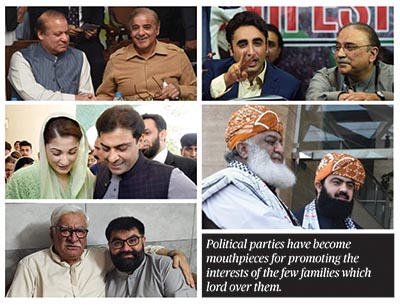
The ghastly sight that we witness today is reflective of the sickness that we have bred. Political parties are a sham. They have become mouthpieces for promoting the interests of the few families which lord over them. The state does not figure at all in their permutations. So the PML-N is Nawaz Sharif and the PPP is Bhutto/Zardari clan whose interests are served by these private limited political parties. The state is there to be ravaged to fill up the coffers of these individuals so that they could gather enough illicit funds to keep it hostage in their poisonous tentacles.
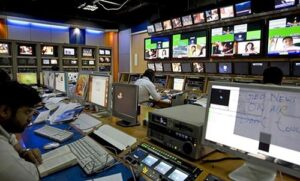
The tragedy is that the state is now buried under layers and layers of deceit and deception accumulated over decades which have distorted its face. Under the circumstances, even a genuine effort for retrieval has scant chance of success. A long and painful struggle is the only option that could help free the state from the bondage of individuals and help it transit to its foundational ideals and become the protector of its marginalised people who have been cruelly pushed to the brink.
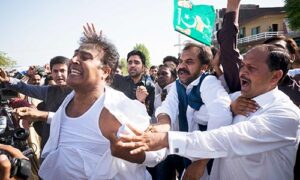
This is no easy task as it can ruffle numerous powerful fiefdoms which have been hoisted by exploiting the largesse of the state which they ravaged with impunity. We have reached a point which has obliterated the distinction between those many who have indulged in remorseless plunder and those few who may still have some compassion left in them for the state. But looking for the latter community of people may be an immense challenge in itself.
It is also a reality that we have reached an abysmally low point in our existence as a nation. It is a condition which may no longer be sustainable. The state has been reduced to a skeleton going around with a begging bowl while those who have skinned it disdainfully are parked in the most luxurious properties with no fear of accountability. They have virtually bought all organs of the state with their illicit billions, which are incessantly engaged in either proving their masters’ innocence before the people, or affording them prolonged stays and relief on one pretext or the other so that they could continue escaping the clutches of the law. This is so because the system has been tailored to suit the profit of the dishonest, not the convenience of the poor and the needy people who are, in fact, disparaged and thrown to the wolves. They have no one to heal their wounds and no one to speak a word of sympathy. It is like Pakistan is not their country. They remain strangers here.
There is a reason which has cultivated this feeling of disempowerment among people. From very early on, and much against the dream of the Quaid, discrimination was scripted into the charter of the new-born state which created divisions along the lines of faith, creed, language and such other identities. Rather than mend these divisions, they have become starker with time, thus hurting the genesis of the state. There are time-faded laws which don’t stand up to the benchmarks of justice and there are regulations which are cynically inimical to the interests of those who require protection. But we persist with these gross aberrations.
Much has gone wrong and much more continues to go wrong. The fact that we have sown the seeds of division does not catch the attention of those who sit in the power echelons. They are deeply immersed in the delusion of their self-righteous demeanour and remain obdurately unwilling to budge. While the big looters continue to use the power of their pelf to remain outside the domain of justice, it is the weak and the impoverished communities which suffer an excess of cruelty. The divide continues to widen further.
As I wrote in a recent article, there is a wicked chain of corruption which has many partners — the beneficiary elite, bureaucracy, judiciary and the media being the principal ones. They have joined hands in a concerted effort to sabotage the working of the government so that the remedial policies which could have helped reverse the tide of division and destruction are not implemented in earnest. While the unworthy roles of the beneficiary elite, bureaucracy and the judiciary has an historical relevance to them, it is the media that stands out in the current times on account of the sinister and misleading hand it is playing in distorting reality and creating an aura around people who are established criminals. They have been convicted by the apex court of the country and are now fugitives before the law. But they remain the darlings of the media because they have the booty in abundance which they share generously with their operators in the print and electronic industry. Nothing could be more gruesome than this partnership which is deeply rooted in crime and corruption and devoted to protecting the perpetrators.
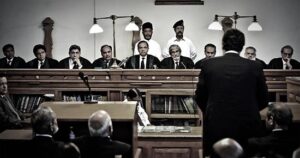
The short part of the Quaid’s speech of August 11 that I have quoted above is the core recipe for a tolerant and progressive Pakistan that he had envisioned. It is now clouded among so many intricate contradictions that even bringing it out in the open may be a task of much labour. But there is no alternative either. We have failed miserably in devising and practicing various prescriptions which have plunged the country deep in the valley of darkness. The daunting task is to take it out of there and put it on a course to salvation.
Bringing the Quaid’s Pakistan back is really a multifaceted task which requires both conviction and courage to undertake: conviction in the fact that it is the right thing to do and courage that it is imperative to do it. But, no individual alone can accomplish it. The immensity of the task and the pitfalls that may have to be faced in the process require a brave and collective effort. The constitution and the laws flowing from it will have to be reviewed. The working of the institutions, particularly those in the domain of religious education, will have to be regulated. Strictures which are inimical to the foundational principles of equity will have to be done away with. Equality of all faiths before law will have to be ensured and contrarian regulations abolished. The judicial system will need a special review to structure it on the sustainable foundations of provision of justice for all. Bureaucracy will have to shed off its disdainful pretensions of being the masters and perform their due role as public servants. Media will have to be shown the mirror so that they are able to take off their masks of prejudice and stop selling their written and spoken word in exchange for the din of coins. On top of that, the nation will have to espouse compassion in preference to cruelty.
Quaid’s Pakistan is smoking, simmering and smouldering from grievous fault lines which have emerged over years of regressive policies followed by succeeding governments. These have landed Pakistan in a pit with no thought process devoted to getting it out of there. With time, we are lapsing further with thickening clouds of religiosity hovering over and their shadows lengthening with each passing day. What is needed is the formulation of a national effort to first gauge where we stand today and why, and then evaluate how we can break the vicious stranglehold of regression which is only getting tighter with time.
A near-miracle at the time of its creation, Pakistan requires another miracle to become the country it was envisioned to be. It was no easy task then, and it is going to be no easy task now. It has been rendered even more difficult with the adoption of policies which run contrary to the shape of the state the Quaid had stipulated. Nullifying the caustic effects of the strictures pursued in the past is a Herculean task. Even more difficult will be the challenge of scraping those policies which have caused the damage and formulating new ones which may be construed controversial by a regressive mindset which has evolved over time.
Yet it is a task which has to be undertaken in earnest as, otherwise, the process of degeneration will only accentuate, further bringing the state down under its vile and unbearable weight.
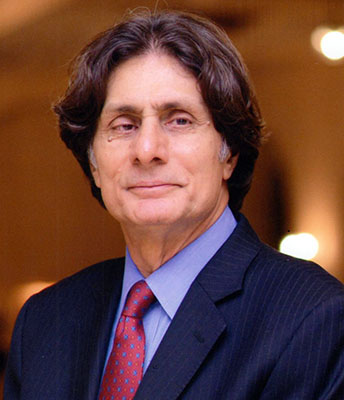
The writer is a Special Assistant to the Prime Minister on Information.


